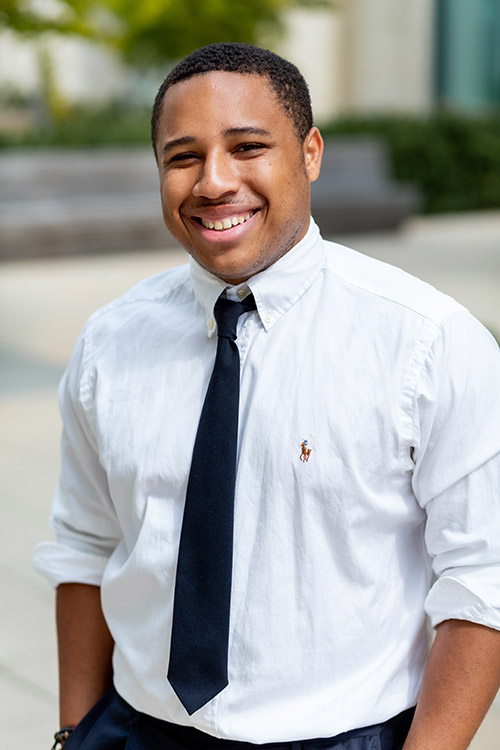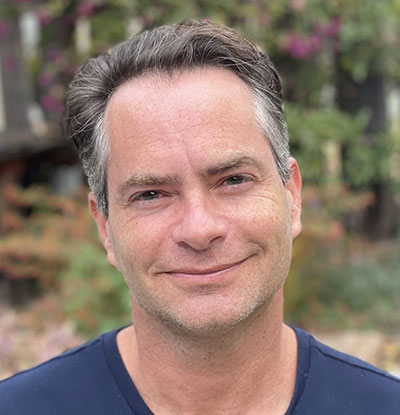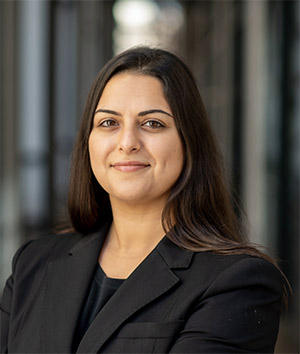By Andrew Cohen

When Kevin Steward ’24 saw Alameda County Public Defender Brendon Woods speak in his 1L Criminal Law class, any ambiguity about his own career path quickly evaporated.
“He spoke of the power of public defense to help vulnerable communities that have been under attack by police and the criminal system as a whole,” Steward recalls. “That really resonated with me.”
Steward’s public defender aspirations got a major boost recently when he received the prestigious E. Barrett Prettyman Fellowship — awarded to just three 3Ls from hundreds of applicants nationwide each year. The two-year LL.M. fellowship at Georgetown Law funnels resources toward developing stellar and devoted indigent defense counsel through rigorous training.
Fellows try cases and hone their public defense skills under close faculty supervision in criminal clinics during their first year, then take classes in clinical teaching and supervision. In their second year, they assume responsibility for providing classroom instruction and supervise students in three criminal justice-focused clinics who represent defendants in adult misdemeanor and juvenile misdemeanor and felony cases.
Steward is the fifth Berkeley Law recipient over the past 14 years — all of whom worked with the school’s Death Penalty Clinic as students. He follows Washington, D.C. Public Defender Safa Ansari-Bayegan ’20, Villanova Law Professor and Clemency Clinic Director Amanda Rogers ’14, Alameda County Deputy Public Defender Joe Goldstein-Breyer ’11, and Los Angeles County Alternate Public Defender Deputy in Charge of Central Misdemeanors and Training Maile Padilla ’10.
Steward will receive a stipend of $70,000 in his first year and $75,000 in his second year, with full benefits as well as full tuition and fees.
Launching point
“I hope this fellowship will make me the best public defender possible and help me support my clients who deserve the best representation,” he says. “After working with a client, I will continue to move on with my day while the client and their family have to deal with their life-altering situation. I hope to use immense empathy, support, and expertise to help them stand against the power of the state.”

Steward learned about the fellowship last summer from Katherine Moss, then his supervisor at the Southern Center for Human Rights and a past Prettyman Fellow herself. She and Ty Alper — also a former Prettyman Fellow, and now co-director of the Death Penalty Clinic and Berkeley Law’s overall Clinical Program — helped him navigate the application process.
The Death Penalty Clinic is just one area at Berkeley Law where Steward has advanced his legal skills. He served as the social justice/public interest co-chair for Law Students for African Descent, worked in the East Bay Community Law Center’s Decriminalization of Poverty Unit, and is a graduate student leader for Black Lives at Cal — a multiyear initiative to celebrate, defend, and advance the legacy of Black people at UC Berkeley.
Noting that Black people make up 33% of prisoners in the United States but only 12% of its overall population, Steward also laments the added societal stigma society they carry beyond their incarceration.
“I look forward to doing my part in changing these numbers, not just for Black people but for all people touched by this system,” he says. “The correlation between poverty and criminal system involvement is clear, and I’m excited to play my small role in supporting these folks beyond the war on poverty.”
Criminal justice credibility
Steward’s summer internship with the Southern Center for Human Rights and his time with the Alameda County Public Defender’s Office, where he did a summer internship and a semester-long externship, provided valuable learning opportunities and strengthened his resolve.

“In both experiences, I also recognized how the difference in the effect of these institutions on Black and brown communities is not much different between Georgia, Alabama, and California,” he says. “The issues represented in each community are the same struggles.
“These issues will persist in America so long as we continue to value money and property over human life. The largest impediment to meaningful change remains the institutions that criminalize individuals for being poor. It has to stop.”
Now in his final semester, Steward entertains thoughts of returning to law school life someday by starting a criminal law clinic. In the meantime, he vows to spend his two-year fellowship — and beyond — working diligently to pursue justice for clients and meaningful reform of the criminal legal system.
“We need more people to recognize that the positions they hold in society are built and maintained on the backs of marginalized communities and the labor of the oppressed, which constitutes the majority of our country,” Steward says. “Despite this situation, there’s hope that we’ve become more in tune with the current conditions … and that we’ll provide the support needed for those to avoid the cyclical nature of criminality.”